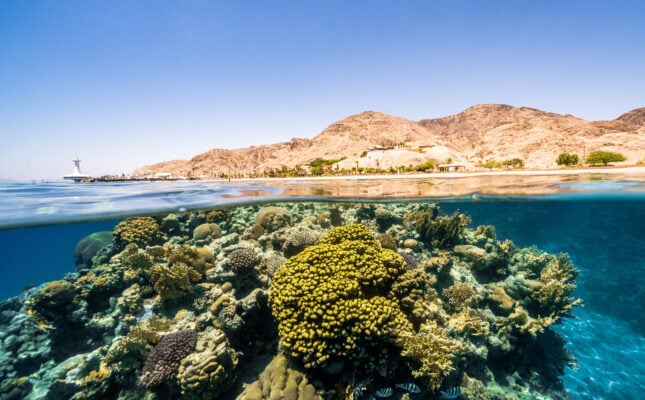A new approach to treating damaged coral reefs, developed at Israel’s Bar-Ilan University, could hold the key to restoring declining coral populations.
By World Israel News Staff
Research conducted jointly by scientists in Israel and Australia has revealed that damaged or dying coral reefs may be restored through the transplanting of healthy reefs, offering hope for reviving coral populations in decline around the world.
The new study, which was recently published in the journal Nature Communications, was led by Dr. Natalie Levy and Prof. Oren Levy from Bar-Ilan University in collaboration with Prof. Ezri Tarazi of the Technion – Israel Institute of Technology, and Prof. David Bourne of James Cook University and the Australian Institute of Marine Science.
The study introduced a method known as “a coral reef ecosystem transplant” (aCRET), where researchers transferred biomimetic terracotta tiles embedded with a diverse community of organisms—including invertebrates and beneficial microorganisms—from a healthy reef to a nearby damaged reef.
The corals from the damaged reef were then attached to these tiles.
The results demonstrated notable improvements in coral health, including increased photosynthetic efficiency, higher populations of symbiotic algae, and reduced stress levels.
These findings suggest that transplanting a healthy ecosystem can significantly boost coral resilience and physiological function.
The researchers designed the biomimetic terracotta tiles to replicate the complex 3D structure of natural coral reefs, providing a perfect environment for diverse organisms to thrive.
After allowing the organisms to grow on the tiles for six months, the tiles—along with their rich, biologically active substrate—were transported to the damaged reef located six km away.
Following an additional six months, corals on these tiles showed substantial improvements compared to corals grown on tiles with substrate from the damaged reef.
In a parallel experiment, the researchers confirmed that the transfer of substrate from a damaged reef to a healthy reef produced less favorable results, reinforcing the benefits of the healthy reef ecosystem transplant.
“This innovative approach underscores the critical role of healthy reef ecosystems in restoring coral health and resilience,” said Dr. Natalie Levy, lead researcher of the study.
“The results highlight the potential of ecosystem transplantation as an effective, sustainable restoration tool that can be integrated with other coral restoration methods like coral gardening and artificial reefs.”
The study’s findings point to aCRETs as a viable and flexible solution for coral reef restoration globally, especially in areas facing significant environmental stress.
This cost-effective technique could complement and enhance existing restoration strategies, helping to protect and restore coral ecosystems vital for marine biodiversity.
However, the researchers stress that for the best outcomes, local reefs should be selected as close as possible for transplanting, and additional long-term studies are essential to fully understand the ecological impacts on different coral species and reef environments.
“This research advances our understanding of coral restoration and provides an invaluable tool to help address the ongoing global coral crisis,” said Prof. Oren Levy.
“By using healthy ecosystems to regenerate damaged reefs, we can work towards more resilient, sustainable coral ecosystems that may one day recover from climate change and other threats.”





